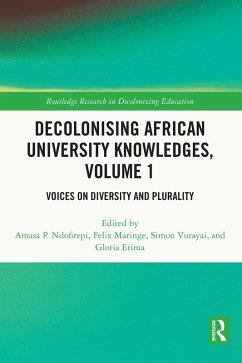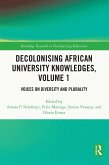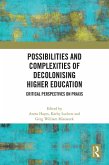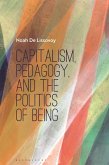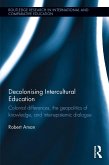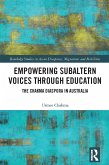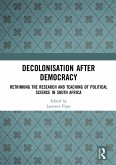Decolonising African University Knowledges, Volume 1 (eBook, ePUB)
Voices on Diversity and Plurality
Redaktion: Ndofirepi, Amasa P.; Erima, Gloria; Vurayai, Simon; Maringe, Felix
42,95 €
42,95 €
inkl. MwSt.
Sofort per Download lieferbar

21 °P sammeln
42,95 €
Als Download kaufen

42,95 €
inkl. MwSt.
Sofort per Download lieferbar

21 °P sammeln
Jetzt verschenken
Alle Infos zum eBook verschenken
42,95 €
inkl. MwSt.
Sofort per Download lieferbar
Alle Infos zum eBook verschenken

21 °P sammeln
Decolonising African University Knowledges, Volume 1 (eBook, ePUB)
Voices on Diversity and Plurality
Redaktion: Ndofirepi, Amasa P.; Erima, Gloria; Vurayai, Simon; Maringe, Felix
- Format: ePub
- Merkliste
- Auf die Merkliste
- Bewerten Bewerten
- Teilen
- Produkt teilen
- Produkterinnerung
- Produkterinnerung

Bitte loggen Sie sich zunächst in Ihr Kundenkonto ein oder registrieren Sie sich bei
bücher.de, um das eBook-Abo tolino select nutzen zu können.
Hier können Sie sich einloggen
Hier können Sie sich einloggen
Sie sind bereits eingeloggt. Klicken Sie auf 2. tolino select Abo, um fortzufahren.

Bitte loggen Sie sich zunächst in Ihr Kundenkonto ein oder registrieren Sie sich bei bücher.de, um das eBook-Abo tolino select nutzen zu können.
This timely work investigates the possibility of unyoking and decolonising African university knowledges from colonial relics. It claims that academics from socially, politically, and geographically underprivileged communities in the South need to have their voices heard outside of the global power structure.
- Geräte: eReader
- mit Kopierschutz
- eBook Hilfe
Andere Kunden interessierten sich auch für
![Decolonising African University Knowledges, Volume 1 (eBook, PDF) Decolonising African University Knowledges, Volume 1 (eBook, PDF)]() Decolonising African University Knowledges, Volume 1 (eBook, PDF)42,95 €
Decolonising African University Knowledges, Volume 1 (eBook, PDF)42,95 €![Possibilities and Complexities of Decolonising Higher Education (eBook, ePUB) Possibilities and Complexities of Decolonising Higher Education (eBook, ePUB)]() Possibilities and Complexities of Decolonising Higher Education (eBook, ePUB)40,95 €
Possibilities and Complexities of Decolonising Higher Education (eBook, ePUB)40,95 €![An Early Venture in Decolonization - British Students at Indian and South Asian Universities (eBook, ePUB) An Early Venture in Decolonization - British Students at Indian and South Asian Universities (eBook, ePUB)]() Mary Searle-ChatterjeeAn Early Venture in Decolonization - British Students at Indian and South Asian Universities (eBook, ePUB)42,95 €
Mary Searle-ChatterjeeAn Early Venture in Decolonization - British Students at Indian and South Asian Universities (eBook, ePUB)42,95 €![Capitalism, Pedagogy, and the Politics of Being (eBook, ePUB) Capitalism, Pedagogy, and the Politics of Being (eBook, ePUB)]() Noah De LissovoyCapitalism, Pedagogy, and the Politics of Being (eBook, ePUB)25,95 €
Noah De LissovoyCapitalism, Pedagogy, and the Politics of Being (eBook, ePUB)25,95 €![Decolonising Intercultural Education (eBook, ePUB) Decolonising Intercultural Education (eBook, ePUB)]() Robert AmanDecolonising Intercultural Education (eBook, ePUB)46,95 €
Robert AmanDecolonising Intercultural Education (eBook, ePUB)46,95 €![Empowering Subaltern Voices Through Education (eBook, ePUB) Empowering Subaltern Voices Through Education (eBook, ePUB)]() Urmee ChakmaEmpowering Subaltern Voices Through Education (eBook, ePUB)40,95 €
Urmee ChakmaEmpowering Subaltern Voices Through Education (eBook, ePUB)40,95 €![Decolonisation after Democracy (eBook, ePUB) Decolonisation after Democracy (eBook, ePUB)]() Decolonisation after Democracy (eBook, ePUB)44,95 €
Decolonisation after Democracy (eBook, ePUB)44,95 €-
-
-
This timely work investigates the possibility of unyoking and decolonising African university knowledges from colonial relics. It claims that academics from socially, politically, and geographically underprivileged communities in the South need to have their voices heard outside of the global power structure.
Dieser Download kann aus rechtlichen Gründen nur mit Rechnungsadresse in A, B, BG, CY, CZ, D, DK, EW, E, FIN, F, GR, HR, H, IRL, I, LT, L, LR, M, NL, PL, P, R, S, SLO, SK ausgeliefert werden.
Produktdetails
- Produktdetails
- Verlag: Taylor & Francis eBooks
- Seitenzahl: 152
- Erscheinungstermin: 14. Oktober 2022
- Englisch
- ISBN-13: 9781000758092
- Artikelnr.: 65434171
- Verlag: Taylor & Francis eBooks
- Seitenzahl: 152
- Erscheinungstermin: 14. Oktober 2022
- Englisch
- ISBN-13: 9781000758092
- Artikelnr.: 65434171
- Herstellerkennzeichnung Die Herstellerinformationen sind derzeit nicht verfügbar.
Amasa P. Ndofirepi holds a PhD in Philosophy of Education and is currently an Associate Professor of Philosophy and History of Education. He has extensive experience in teacher education, previously worked at various higher education institutions in Zimbabwe and South Africa and has research interests in higher education studies from a philosophical perspective. Felix Maringe is a Professor of Higher Education and Head of the School of Education at the University of the Witwatersrand in South Africa. He researches issues of social justice in the Internationalisation and Globalisation of Higher Education. Felix is widely published in refereed journals and has six books to his credit. Simon Vurayai is a post-doctoral research fellow at the University of Johannesburg in South Africa. He holds a PhD in Sociology of Education. He is also a lecturer in the Sociology of Education at Great Zimbabwe University. His research interests are gender studies, social justice, problems in education, sociology of knowledge, sociology of mass media, sociology of development and poverty Gloria Erima is a post-doctoral fellow at the department of Education and Curriculum Studies at the University of Johannesburg in South Africa. Her research interest is centred around issues of social justice in education. She obtained her PhD in Education Leadership and Management at the University of the Witwatersrand in South Africa.
1.Gender, disability and rurality: decoding the themes in the African
university milieu. 2.Reflection on disability (and) educational justice in
Africa's structurally unjust society during the COVID-19 pandemic lockdown.
3.Improving processes, practices and structures in South African higher
education: Voices of students with disabilities. 4.Social justice in higher
education: a quest for equity, inclusion and epistemic access.
5.Decolonizing African university teaching by unyoking Deaf culture from
disability. 6.Theorising feminist voices in the curriculum in an African
university. 7.Knowledge democracy and feminist epistemic struggle in
African universities. 8.Globalisation and commodification of knowledge
liberating women's academic achievements from conventional global power
hierarchies. 9.The place of universities in Africa in the global
information society: A critique. 10.Gender, disability, rurality, and
social injustice in the African university: Opportunities going forward.
Afterword
university milieu. 2.Reflection on disability (and) educational justice in
Africa's structurally unjust society during the COVID-19 pandemic lockdown.
3.Improving processes, practices and structures in South African higher
education: Voices of students with disabilities. 4.Social justice in higher
education: a quest for equity, inclusion and epistemic access.
5.Decolonizing African university teaching by unyoking Deaf culture from
disability. 6.Theorising feminist voices in the curriculum in an African
university. 7.Knowledge democracy and feminist epistemic struggle in
African universities. 8.Globalisation and commodification of knowledge
liberating women's academic achievements from conventional global power
hierarchies. 9.The place of universities in Africa in the global
information society: A critique. 10.Gender, disability, rurality, and
social injustice in the African university: Opportunities going forward.
Afterword
1.Gender, disability and rurality: decoding the themes in the African
university milieu. 2.Reflection on disability (and) educational justice in
Africa's structurally unjust society during the COVID-19 pandemic lockdown.
3.Improving processes, practices and structures in South African higher
education: Voices of students with disabilities. 4.Social justice in higher
education: a quest for equity, inclusion and epistemic access.
5.Decolonizing African university teaching by unyoking Deaf culture from
disability. 6.Theorising feminist voices in the curriculum in an African
university. 7.Knowledge democracy and feminist epistemic struggle in
African universities. 8.Globalisation and commodification of knowledge
liberating women's academic achievements from conventional global power
hierarchies. 9.The place of universities in Africa in the global
information society: A critique. 10.Gender, disability, rurality, and
social injustice in the African university: Opportunities going forward.
Afterword
university milieu. 2.Reflection on disability (and) educational justice in
Africa's structurally unjust society during the COVID-19 pandemic lockdown.
3.Improving processes, practices and structures in South African higher
education: Voices of students with disabilities. 4.Social justice in higher
education: a quest for equity, inclusion and epistemic access.
5.Decolonizing African university teaching by unyoking Deaf culture from
disability. 6.Theorising feminist voices in the curriculum in an African
university. 7.Knowledge democracy and feminist epistemic struggle in
African universities. 8.Globalisation and commodification of knowledge
liberating women's academic achievements from conventional global power
hierarchies. 9.The place of universities in Africa in the global
information society: A critique. 10.Gender, disability, rurality, and
social injustice in the African university: Opportunities going forward.
Afterword
